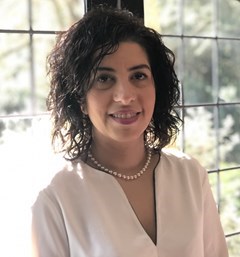In 2019, Dr Eirini Velliou, when she was at the University of Surrey, was awarded an Industrial Fellowship. She is now Associate Professor at the Centre for 3D models of Health and Disease, within the Division of Surgery and Interventional Science at UCL. The Royal Academy of Engineering’s Industrial Fellowships strengthen the links between universities and industry as well as encouraging collaborative partnerships.
Dr Eirini Velliou is a chemical engineer working in the field of bioprocess and tissue engineering. Her Industrial Fellowship assignment aims to generate a 3D reconstructed human skin-equivalent for cosmetics and skincare screening with her industrial partner, Unilever Research and Development PLC.
Dr Velliou’s team is active at the interface of biomaterials, bioreactors and biological systems. The group aims to produce 3D laboratory models of healthy or diseased tissues. These laboratory models can help reduce the use of animal experimentation for both cosmetic and biomedical uses.
In terms of tissue types, a big part of the group’s research activities is focused on developing biochemically and biomechanically complex 3D in vitro models of different types of cancer such as pancreatic and ovarian. By analysing the microenvironment of tissues, it will enable the study of their stiffness and porosity, cell-cell and cell-matrix interactions, diffusion of oxygen, nutrients and metabolites as well as distribution of the vascularisation. This will allow clinicians to design personalised treatments for specific individuals.
Dr Velliou’s work with Unilever will create a ‘skin-bioreactor’ with tuneable structure and perfusion, validated by using transdermal permeation studies of Unilever products. The skin bioreactor will serve as a low cost, animal-free skin surrogate for cosmetics screening. With this tool, Unilever will be able to conduct accurate skin product screening and deliver faster products from bench to consumption.
About Industrial Fellowships
The Royal Academy of Engineering Industrial Fellowships scheme enables mid-career academics and industrialists to undertake a collaborative research project in either an industrial or academic environment, where one party would host the other.

